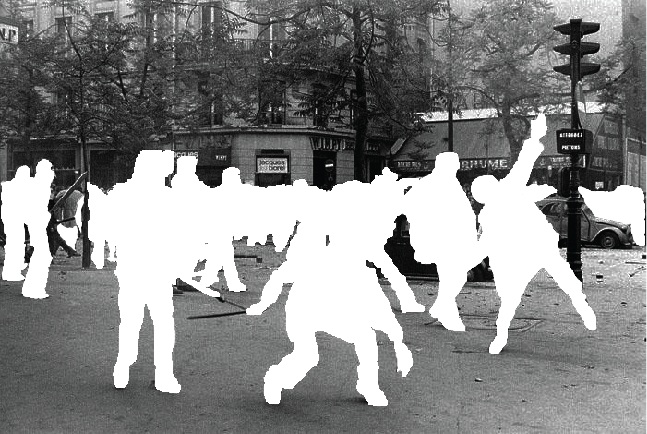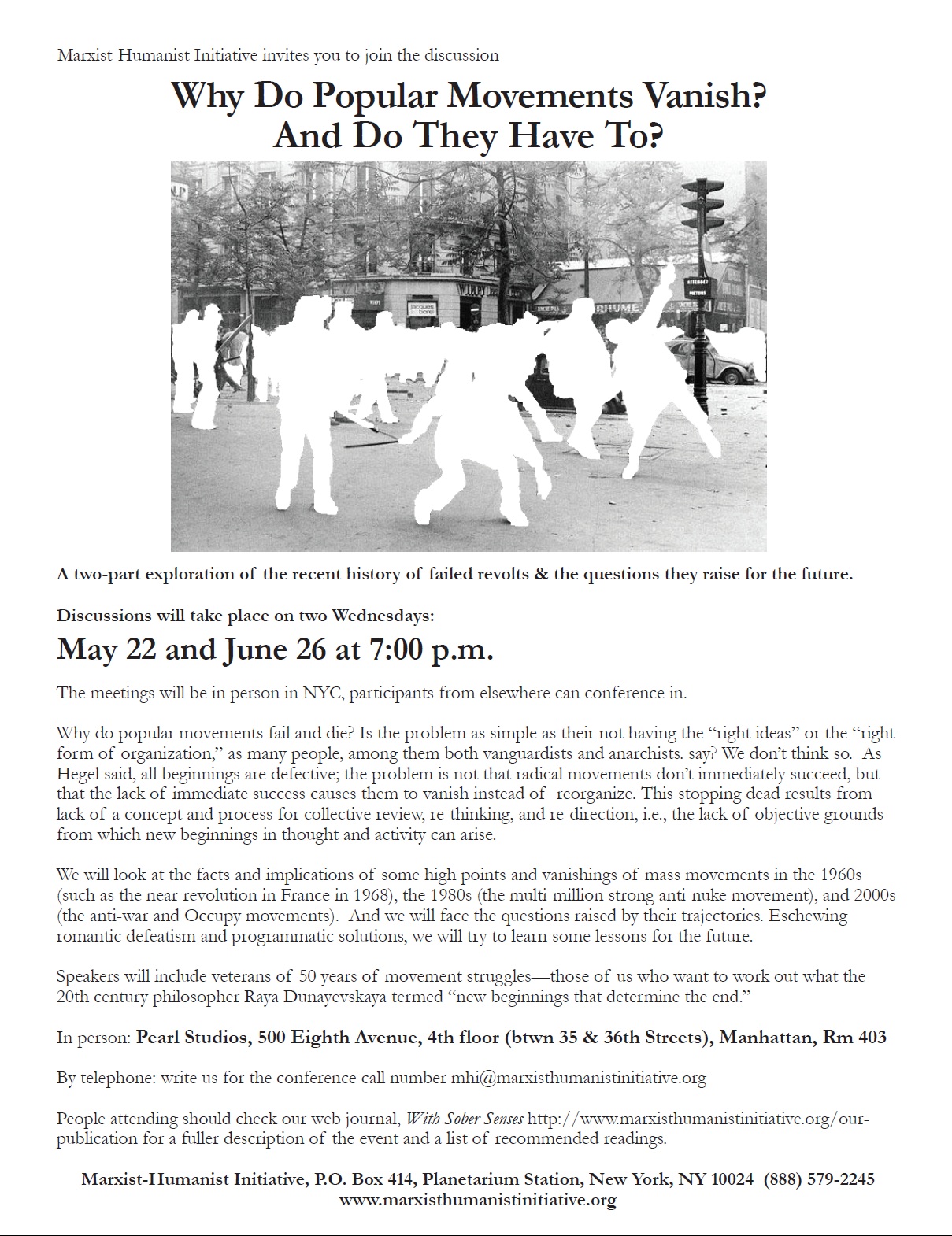[The original announcement of both meetings was amended June 3, 2013]
Marxist-Humanist Initiative invites you to join the discussion:
Why Do Popular Movements Vanish? And Do They Have To?
MHI will hold its second discussion to explore the recent history of failed revolts, the questions they raise, and the organizational challenges they pose to the movements, on
June 26 at 7:00 p.m.
In person: Pearl Studios, 500 Eighth Avenue, 4th floor (btwn 35 & 36th Streets), Manhattan, Room 403
By telephone: write us for the conference call number: mhi@marxisthumanistinitiative.org
Why do popular movements fail and die? Is the problem as simple as their not having the “right ideas” or the “right form of organization,” as many people say–both vanguardists and anarchists? We don’t think so. As Hegel noted, all beginnings are defective; the problem is not that radical movements don’t immediately succeed, but that the lack of immediate success causes them to vanish instead of to reorganize. We think this “stopping dead” results from the lack of a concept and process for collective review, re-thinking, and re-direction. What procedures and processes might movements institute in order to go through “second negation,” so that new beginnings in thought and activity have a chance to develop?
In the first discussion, we looked at the facts and implications of some high points and vanishings of mass movements in the 1960s (such as the Civil Rights Movement and the near-revolution in France in 1968), the 1980s (multi-million strong international anti-nuke movement), and 2000s (anti-war, anti-globalization and Occupy movements). Now we will face concretely the questions raised by their trajectories. Eschewing both romantic defeatism (the view that the struggle is all-important, and winning goals is not), and vanguardist solutions, we will try to pose suggestions for the re-organization of left thought and activity.
Click to view video of May 22nd meeting:
———————————————————————————————————-
[Added May 15, 2013] Some suggested preparatory readings are here
1979: Dunayevskaya, “Not so Random Thoughts on: What is Philosophy? What is Revolution?”
Page numbers are to Volume XIII of her Archives, “Supplement to the Raya Dunayevskaya Collection,” at Wayne State University Archives of Labor and Urban Affairs, Detroit, MI 48202. Excerpts:
p. 10841. Dated Dec. 22, 1986. Part of entry 18 in the Guide that starts on p. 10837
pp. 10953-5. Dated May 19, 1987. Part of entry 36 that starts on p. 10942. The most relevant part is at the very end, on p. 10955, but the previous 2 pages may help put it in context.
pp. 10963-4. Dated May 25, 1987. Part of entry 38 that starts on p. 10959. This is a draft of her final (June 1) presentation. The paragraph in question isn’t in the June 1 version. It is in between “Because …” and “Take Pannekoek.”
Flier for May 22nd meeting (click twice for a more legible view):
3 Comments on “Why Do Popular Movements Vanish? And Do They Have To?”
◾
David Berger on Wed, 8th May 2013 6:52 pm
At the above session, who is speaking on the Occupy movement? Do you have a person who was an actual participant before, during and, especially, after the actual events in Zuccotti Park?
◾
Alvaro on Thu, 9th May 2013 8:57 am
Although I’ve heard about the organization for a while, this would be my first time participating in a conference. I’m looking forward to it.
Thanks,
Alvaro
◾
Anne Jaclard on Tue, 14th May 2013 9:37 am
In response to David’s question above: I, for one, will be speaking about OWS and other movements for social change over the past 50 years, in the context of the question posed by this meeting: what happens to them after they fail to make change? Are there objective conditions we can establish for thinking through a basis for new beginnings, so the high points of failed movements become grounds for future action, and we don’t just keep spinning our wheels?
I hope that your inquiry about “an actual participant…especially, after the actual events in Zuccotti Park,” means that you know there were such discussions within OWS after its eviction. I’m in NYC and didn’t see any announcements of public meetings on the subject; I only saw daily marches and demonstrations and proclamations that attempted to put a good spin on it. When MHI initiated such a discussion last spring, we were initially met with participants’ comments about how great the experience had been and how great its new projects were, as if there were a seamless flow and no defeat of the occupation itself, and no need to re-think what to do. I hope I’m wrong, that I just missed calls for public discussion or it was done privately, and that you will contribute to our meetings now.
Coincidently, we’ve just received a new comment on one critique of a prominent strain of thought in OWS:

